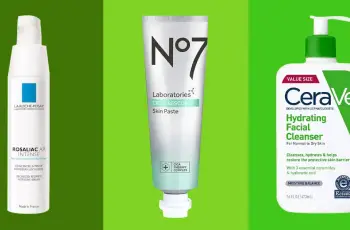
Like cleansers and sunscreens, facial moisturizers are daily essentials for all skin types, not just dry skin. While moisturizers hydrate, the right cream can repair the skin’s barrier function, restore firmness, soften texture, smooth fine lines, and more.
With so many formulas to choose from (light gel, face oil, skin cream?), it can be overwhelming to figure out which one is right for your skin. Below we explain the different types of moisturizers and how to use them.
Applying Moisturizer. Let’s start with the basics. Everyone can benefit from moisturizing twice a day: once in your morning skincare routine and once before bed.
Depending on your preference, you can use the same formula twice or opt for a thicker formula in the evening, as skin loses moisture overnight.
Moisturizer should be one of the last steps in your skincare routine, after serums and treatments and before sunscreen and facial oils (if desired). Warm a peanut-sized amount of the formula in your hands and gently massage into your skin in circular motions to allow the product to absorb.
Be careful not to pull or strain your skin. If you want to apply sunscreen or makeup afterward, let the formula sit for a few minutes first.
The Best Moisturizer for Your Skin Type. Not all moisturizers are created equal, and some may work better for you than others depending on your skin type, concerns, and goals. Find the right solution for your skin below.
Oily Skin. Oily skin is genetically predisposed to produce too much sebum (a waxy substance that keeps moisture in the skin), so adding more moisture may seem counterintuitive, especially if you’re prone to oiliness and shine. While oily skin
is never dry (lacking fat), it can be dehydrated (lacking moisture).
This is more common than you think, especially since oily skin tends to prefer formulas that absorb excess sebum, like the clay in our cleansing masks. (That’s why we always recommend moisturizing your skin after applying a mask or face scrub.)
When skin is dehydrated, it signals the body to produce more sebum to compensate for the loss of moisture, which can clog pores and cause acne. To find the perfect balance, nourish your skin with a hydrating, lightweight gel formula like our Dewy Moisturizing Gel Cream.
It contains sodium hyaluronate (which has similar properties to hyaluronic acid and can bind 1,000 times its weight in water) and aloe leaf juice to hydrate the skin without weighing it down.
Dry skin. Dry skin naturally produces less sebum, which means dry skin is always searching for moisture, moisture, moisture. If your skin is dry, follow up with a moisturizer that’s naturally thick and rich in skin-nourishing oils, like jojoba oil, squalane (found in our Rich Moisturizer), and black currant seed oil. If it’s very dry, apply a facial oil afterward.
Remember: Skin can become dry and dehydrated. If you find moisturizer isn’t enough, add a drop or two of Hyaluronic Acid Serum Booster to your moisturizer before applying. Do you have dry elbows or knees? Hydrate the skin under your chin with Keep It Suple Body Oil.
Combination skin. Dry in some places, oily in others…combination skin can be a challenge when it comes to moisturizers. One way to do this is to use a lighter formula on oily areas and a richer lotion or balm on dry areas to keep the skin hydrated.
If that’s a little too complicated for you, opt for a hybrid like our Antioxidant Oil Serum. It’s both moisturizing and hydrating, offering the best of both worlds in one bottle.
Acne-prone skin. Acne-prone skin can also be dry, oily, or a combination of both. Choose the type that best suits your moisturizing and hydrating needs, and be aware of the term “non-comedogenic.” This means the formula
is proven not to clog pores, something people with acne-prone skin should definitely avoid.
Dewy spots are non-comedogenic. The non-comedogenic ingredients in our Hydrating Plumping Mask, including tea tree oil, squalane, and rosehip oil, also provide moisture. Aging Skin As we age, our skin produces less oil
Dryness worsens, and fine lines and wrinkles become more noticeable. Lack of moisture also weakens the skin barrier, allowing external invaders like pollution and UV rays to cause oxidative stress (aka damage).
To support aging skin, add a night cream to your routine. Our skin goes into repair mode overnight, releasing growth hormones, stimulating collagen production, and shedding old skin cells. A Night Cream Like Recovery Mode
Advanced night creams support these functions while preventing moisture loss, reducing fine lines, and smoothing wrinkle structure.
Don’t forget the rest of your body. Retinol moisturizers relieve dryness, firm skin, and repair age spots. Dull Skin + Uneven Skin Tone Worth a note: Dull skin is a common byproduct of dehydration.
If quenching your skin’s thirst isn’t exactly refreshing (or maybe you’re also suffering from hyperpigmentation and uneven skin tone), opt for a vitamin C moisturizer that brightens and hydrates at the same time. For a rounded glow
and moisture barrier support, try our Weekend Glow Daily Brightening Moisturizers. With 2.5% vitamin C, you’ll see visible results without the irritation (a common side effect of traditional vitamin C). For more radiant skin
You can also use luminous glow drops; their polyglutamic acid is also four times more hydrating than hyaluronic acid.


